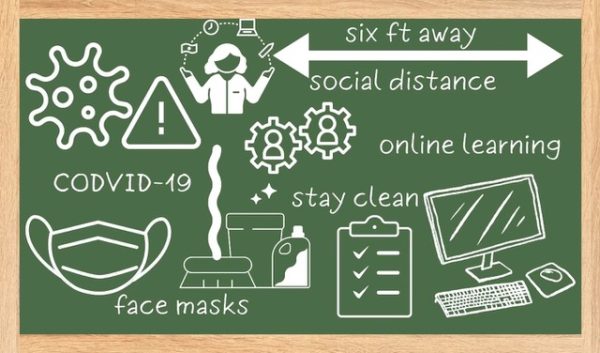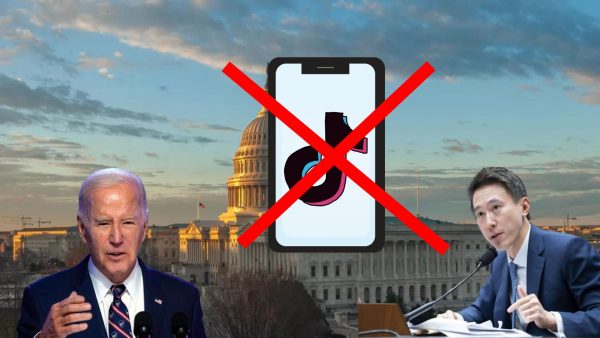Florida’s ‘Don’t Say Gay’ bill sets precedent for LGBTQ+ youth in schools
Florida Gov. Ron DeSantis signed the bill on Mar. 28, and it will be implemented on July 1, 2022.
2022 has re-introduced several ongoing controversies regarding gender discretion and inclusivity. Florida Governor, Ron DeSantis, has signed what has been called by some the “Don’t Say Gay Bill,” officially included in the Parental Rights in Education Bill, also known as House Bill 1557. The recent legislation includes requirements for schools and educators that prohibit them from discussing sexuality and gender identity in the classrooms of young students.
The pertinent portion of the bill says:
Classroom instruction by school personnel or third parties on sexual orientation or gender identity may not occur in kindergarten through grade [three] or in a manner that is not age appropriate or developmentally appropriate for students in accordance with state standards.
DeSantis’s press secretary, Christina Pushaw, said on Twitter that the bill would protect kids from “grooming” and that opponents of the bill are “probably groomers,” a term she used to describe pedophiles. In a separate tweet, she also said “If you’re against the Anti-Grooming Bill, you are probably a groomer or at least you don’t denounce the grooming of [four]-[eight] year old children. Silence is complicity. This is how it works, Democrats, and I didn’t make the rules.”
After he signed the bill, DeSantis said that it will ensure, “that parents can send their kids to school to get an education, not an indoctrination.” He is also running for re-election, and has been labeled as a potential candidate for the 2024 presidential election.
According to NBC, Joe Harding, a Republican politician who introduced the bill, claimed that he wanted to create it to “empower” parents who want stricter guidelines when it comes to curriculum for their children.
“It’s actually providing boundaries, and it’s fair to our teachers and our school district to know what we expect,” Harding said.
In an interview with CNN, UC Berkeley philosopher and gender theorist, Judith Butler, commented on the “Parental Rights” and “Individual Freedom” bills.
“There’s a fantasy going on that children are being indoctrinated,” Butler said. “Parents and communities want to exercise forms of censorship to stop their children from knowing about how the world is being organized and how different people are living their lives.” She believes that Republican politicians are tapping into parents’ fears when it comes to their children’s sexualities and how some parents believe they should be raised.
In Jan. of 2022, PEN America had reported that there had been a sharp increase of “educational gag orders” that are targeting speech in regards to LGBTQIA+ identity. Gag orders, also known as suppression orders, are issued by a government, court, or private entity that require an individual to refrain from making public comments. The website specifically states, “While race, sex, and American history remain the most common targets of censorship, bills silencing speech about LGBTQ+ identities have also surged to the fore. Currently, 15 such bills are under consideration in [nine] states.” This statement comes after a steep incline of book bans in schools and public libraries across the U.S. that have targeted books that include LGBTQIA+ characters, or issues regarding critical race theory.
After the bill’s announcement and backlash, several other predominantly Republican states, including Ohio, Missouri, Louisiana, Iowa, Georgia, Texas, Idaho and others have also filed for similar legislation. A CNN analysis conducted by Giselle Rhoden included a map of more than 150 “anti-LGBT” bills introduced at the state level so far this legislative season. Some examples of these proposed bills include:
- A Tennessee ban on any discussion, textbook or instructional materials on “LGBT issues or lifestyle” in public schools.
- An Iowa ban on transgender women and girls taking part in girls’ sports at public schools.
- An Idaho bill that could punish medical personnel who provide gender-affirming health care and parents who agree for their children to receive such care with up to life in prison.
Students across the state have responded to the bill and protested at their schools and at the Florida capital. The bill will take effect after July 1, 2022, and will impact students of all grade levels, including their school environment and curriculum.
Your donation will support the student journalists of West Linn High School. Your contribution will allow us to continue to produce quality content by purchasing equipment, software, and continuing to host our website on School Newspapers Online (SNO).

Sydney McCrone, senior, is the Social Media editor for wlhsNOW.com, and has been channeling her love of writing since her freshman year. When she is...


























![Game, set, and match. Corbin Atchley, sophomore, high fives Sanam Sidhu, freshman, after a rally with other club members. “I just joined [the club],” Sidhu said. “[I heard about it] on Instagram, they always post about it, I’ve been wanting to come. My parents used to play [net sports] too and they taught us, and then I learned from my brother.”](https://wlhsnow.com/wp-content/uploads/2024/03/MG_7715-2-1200x800.jpg)





![The teams prepare to start another play with just a few minutes left in the first half. The Lions were in the lead at halftime with a score of 27-0. At half time, the team went back to the locker rooms. “[We ate] orange slices,” Malos said. “[Then] our team came out and got the win.”](https://wlhsnow.com/wp-content/uploads/2023/10/IMG_2385-1200x800.jpg)





![At the bottom of the third inning, the Lions are still scoreless. Rowe stands at home plate, preparing to bat, while Vandenbrink stands off to the side as the next batter up. Despite having the bases loaded, the team was unable to score any runs. “It’s just the beginning of the season. We’re just going to be playing out best by June, [and] that’s where champions are,” Rowe said.](https://wlhsnow.com/wp-content/uploads/2024/03/IMG_3077-1200x900.jpg)

















































































